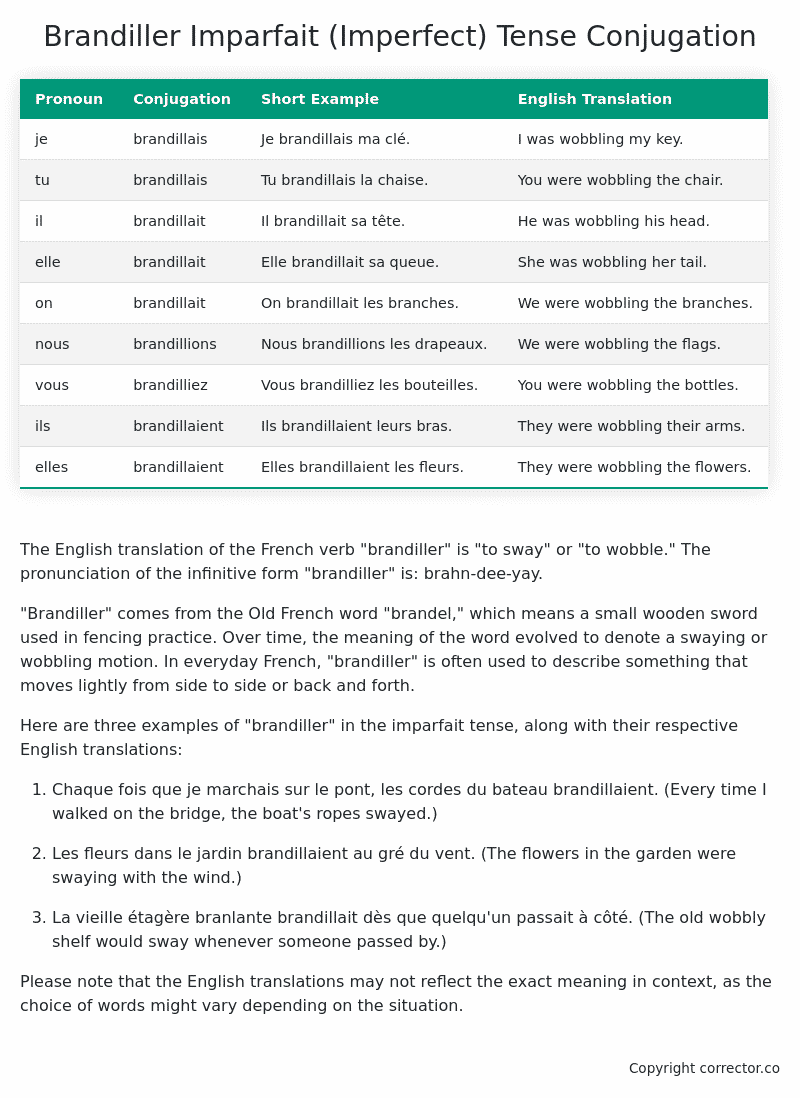Imparfait (Imperfect) Tense Conjugation of the French Verb brandiller
Introduction to the verb brandiller
The English translation of the French verb “brandiller” is “to sway” or “to wobble.” The pronunciation of the infinitive form “brandiller” is: brahn-dee-yay.
“Brandiller” comes from the Old French word “brandel,” which means a small wooden sword used in fencing practice. Over time, the meaning of the word evolved to denote a swaying or wobbling motion. In everyday French, “brandiller” is often used to describe something that moves lightly from side to side or back and forth.
Here are three examples of “brandiller” in the imparfait tense, along with their respective English translations:
-
Chaque fois que je marchais sur le pont, les cordes du bateau brandillaient.
(Every time I walked on the bridge, the boat’s ropes swayed.) -
Les fleurs dans le jardin brandillaient au gré du vent.
(The flowers in the garden were swaying with the wind.) -
La vieille étagère branlante brandillait dès que quelqu’un passait à côté.
(The old wobbly shelf would sway whenever someone passed by.)
Please note that the English translations may not reflect the exact meaning in context, as the choice of words might vary depending on the situation.
Table of the Imparfait (Imperfect) Tense Conjugation of brandiller
| Pronoun | Conjugation | Short Example | English Translation |
|---|---|---|---|
| je | brandillais | Je brandillais ma clé. | I was wobbling my key. |
| tu | brandillais | Tu brandillais la chaise. | You were wobbling the chair. |
| il | brandillait | Il brandillait sa tête. | He was wobbling his head. |
| elle | brandillait | Elle brandillait sa queue. | She was wobbling her tail. |
| on | brandillait | On brandillait les branches. | We were wobbling the branches. |
| nous | brandillions | Nous brandillions les drapeaux. | We were wobbling the flags. |
| vous | brandilliez | Vous brandilliez les bouteilles. | You were wobbling the bottles. |
| ils | brandillaient | Ils brandillaient leurs bras. | They were wobbling their arms. |
| elles | brandillaient | Elles brandillaient les fleurs. | They were wobbling the flowers. |
Other Conjugations for Brandiller.
Le Present (Present Tense) Conjugation of the French Verb brandiller
Imparfait (Imperfect) Tense Conjugation of the French Verb brandiller (You’re reading it right now!)
Passé Simple (Simple Past) Tense Conjugation of the French Verb brandiller
Passé Composé (Present Perfect) Tense Conjugation of the French Verb brandiller
Futur Simple (Simple Future) Tense Conjugation of the French Verb brandiller
Futur Proche (Near Future) Tense Conjugation of the French Verb brandiller
Plus-que-parfait (Pluperfect) Tense Conjugation of the French Verb brandiller
Passé Antérieur (Past Anterior) Tense Conjugation of the French Verb brandiller
Futur Antérieur (Future Anterior) Tense Conjugation of the French Verb brandiller
Subjonctif Présent (Subjunctive Present) Tense Conjugation of the French Verb brandiller
Subjonctif Passé (Subjunctive Past) Tense Conjugation of the French Verb brandiller
Subjonctif Imparfait (Subjunctive Imperfect) Tense Conjugation of the French Verb brandiller
Subjonctif Plus-que-parfait (Subjunctive Pluperfect) Tense Conjugation of the French Verb brandiller
Conditionnel Présent (Conditional Present) Tense Conjugation of the French Verb brandiller
Conditionnel Passé (Conditional Past) Tense Conjugation of the French Verb brandiller
Conditionnel Passé II (Conditional Past II) Tense Conjugation of the French Verb brandiller
L’impératif Présent (Imperative Present) Tense Conjugation of the French Verb brandiller
L’impératif Passé (Imperative Past) Tense Conjugation of the French Verb brandiller
L’infinitif Présent (Infinitive Present) Tense Conjugation of the French Verb brandiller
L’infinitif Passé (Infinitive Past) Tense Conjugation of the French Verb brandiller
Le Participe Présent (Present Participle) Tense Conjugation of the French Verb brandiller
Le Participe Passé (Past Participle) Tense Conjugation of the French Verb brandiller
Struggling with French verbs or the language in general? Why not use our free French Grammar Checker – no registration required!
Get a FREE Download Study Sheet of this Conjugation 🔥
Simply right click the image below, click “save image” and get your free reference for the brandiller imparfait tense conjugation!

Brandiller – About the French Imparfait Tense
NOTE: To take a deep dive into all the French tenses then see our article on Mastering French Tense Conjugation.
Formation of the Imparfait Tense
For regular -er verbs:
For regular -ir verbs
For regular -re verbs
Common Everyday Usage Patterns
Description of Past Habits
Background Information
Mental and Emotional States
It’s employed to express emotions, thoughts, or physical sensations in the past. For example: “J’étais content quand il est arrivé.” (I was happy when he arrived.)
Ongoing Actions
Points to Note About the Imparfait Tense
Passé Composé vs. Imparfait
Conditional
Si Clauses
Narration
I hope you enjoyed this article on the verb brandiller. Still in a learning mood? Check out another TOTALLY random French verb imparfait conjugation!


